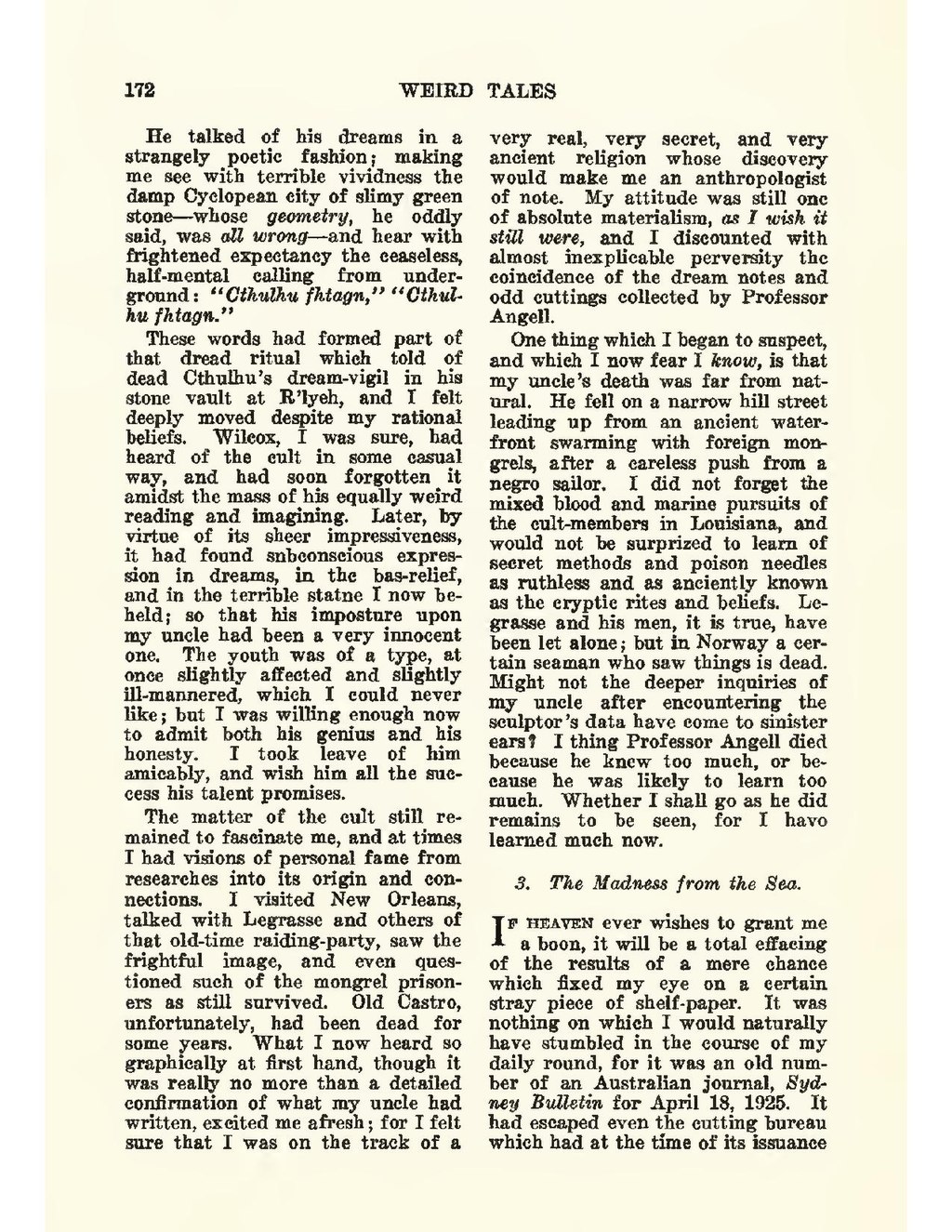He talked of his dreams in a strangely poetic fashion; making me see with terrible vividness the damp Cyclopean city of slimy green stone—whose geometry, he oddly said, was all wrong—and hear with frightened expectancy the ceaseless, half-mental calling from underground: “Cthulhu fhtagn,” “Cthulhu fhtagn.”
These words had formed part of that dread ritual which told of dead Cthulhu’s dream-vigil in his stone vault at R’lyeh, and I felt deeply moved despite my rational beliefs. Wilcox, I was sure, had heard of the cult in some casual way, and had soon forgotten it amidst the mass of his equally weird reading and imagining. Later, by virtue of its sheer impressiveness, it had found subconscious expression in dreams, in the bas-relief, and in the terrible statue I now beheld; so that his imposture upon my uncle had been a very innocent one. The youth was of a type, at once slightly affected and slightly ill-mannered, which I could never like; but I was willing enough now to admit both his genius and his honesty. I took leave of him amicably, and wish him all the success his talent promises.
The matter of the cult still remained to fascinate me, and at times I had visions of personal fame from researches into its origin and connections. I visited New Orleans, talked with Legrasse and others of that old-time raiding-party, saw the frightful image, and even questioned such of the mongrel prisoners as still survived. Old Castro, unfortunately, had been dead for some years. What I now heard so graphically at first hand, though it was really no more than a detailed confirmation of what my uncle had written, excited me afresh; for I felt sure that I was on the track of a very real, very secret, and very ancient religion whose discovery would make me an anthropologist of note. My attitude was still one of absolute materialism, as I wish it still were, and I discounted with almost inexplicable perversity the coincidence of the dream notes and odd cuttings collected by Professor Angell.
One thing which I began to suspect, and which I now fear I know, is that my uncle’s death was far from natural. He fell on a narrow hill street leading up from an ancient waterfront swarming with foreign mongrels, after a careless push from a negro sailor. I did not forget the mixed blood and marine pursuits of the cult-members in Louisiana, and would not be surprized to learn of secret methods and poison needles as ruthless and as anciently known as the cryptic rites and beliefs. Legrasse and his men, it is true, have been let alone; but in Norway a certain seaman who saw things is dead. Might not the deeper inquiries of my uncle after encountering the sculptor’s data have come to sinister ears? I thing Professor Angell died because he knew too much, or because he was likely to learn too much. Whether I shall go as he did remains to be seen, for I have learned much now.
3. The Madness from the Sea.
If heaven ever wishes to grant me a boon, it will be a total effacing of the results of a mere chance which fixed my eye on a certain stray piece of shelf-paper. It was nothing on which I would naturally have stumbled in the course of my daily round, for it was an old number of an Australian journal, Sydney Bulletin for April 18, 1925. It had escaped even the cutting bureau which had at the time of its issuance
